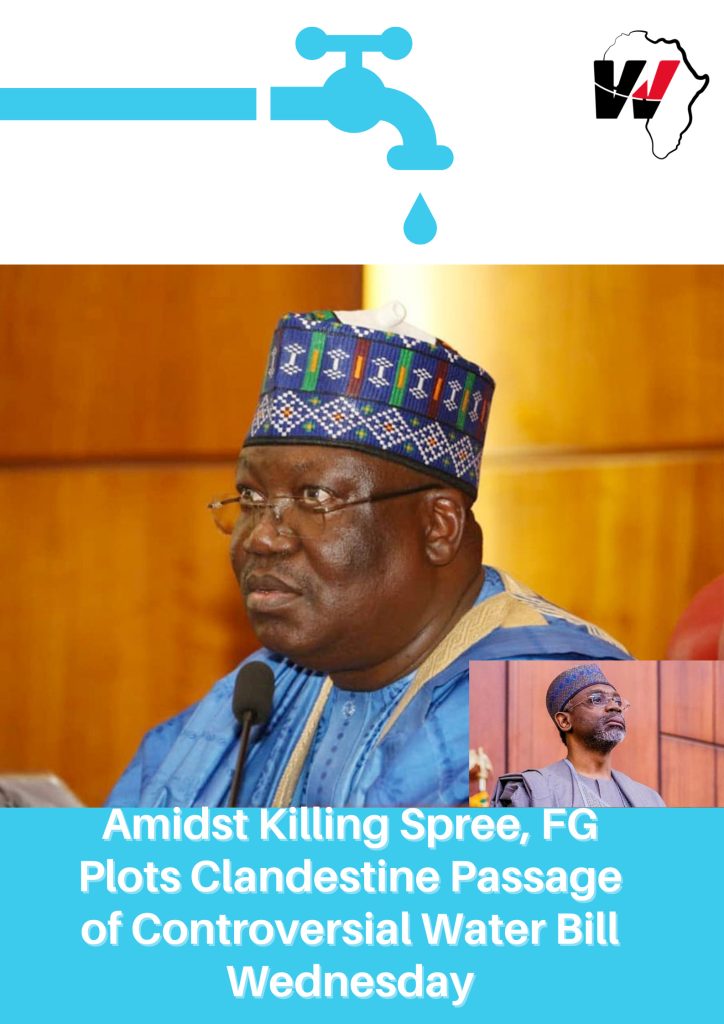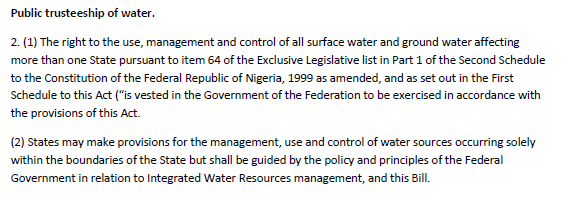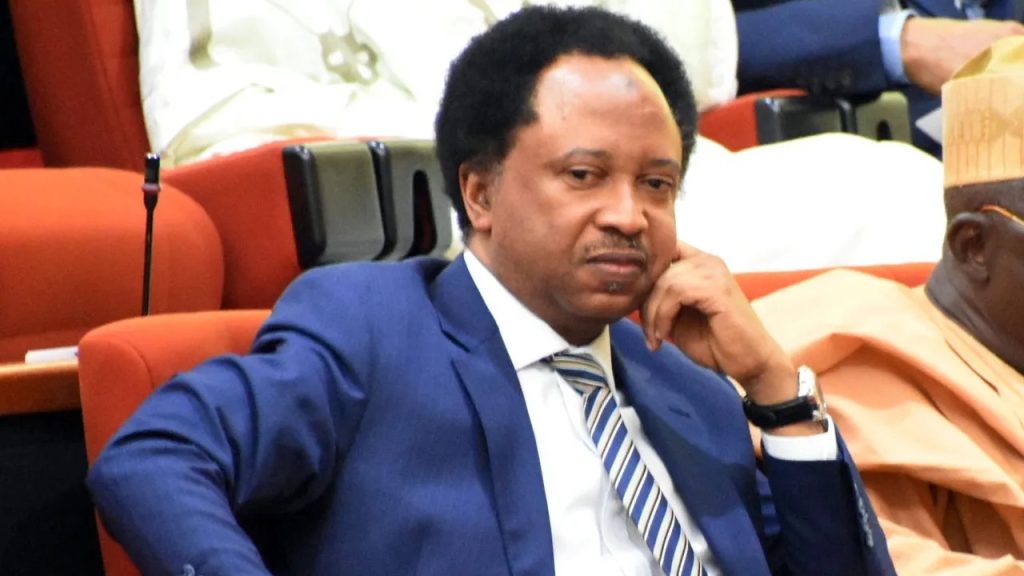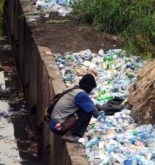
Amidst a surge in killings carried out by suspected Fulani herdsmen across many parts of the country, particularly in the Northwest and Middle Belt, Nigeria’s Federal Government is pushing for the highly contentious National Water Resources Bill, 2022, to be passed secretly by the National Assembly on Wednesday December 28, 2022.
It will be recalled that on December 23, a mass burial was conducted for 40 people murdered by suspected Fulani herdsmen in Mallagum and Sogwon communities in Kaura Local Government Area of Kaduna State. To date, neither the Kaduna State Government nor the Federal Government has reacted to the unprovoked attacks, which also resulted in the destruction of homes and food crops.
Several analysts agree that the struggle for water and fertile grazing fields by nomadic herdsmen – many of whom are not Nigerian citizens, but find their way into the country via long-forgotten cattle grazing routes – is at the heart of the killings.
Following multiple accusations of genocide by victims of these massacres, a comprehensive 2020 report titled “Silent Slaughter: Genocide In Nigeria And Implications For The International Community” provided significant backing for claims that these killings are ethnic and religious in nature, and can thus be accurately described as genocide.
Against this backdrop, opposition has steadily mounted to the Water Resources Bill which was first introduced to the House in 2020. Some have expressed a belief that any attempt to hand over regulation of waterbodies across the country to the Federal Government is driven by an ulterior motive.
Others fear that the Federal Government, led by Muhammadu Buhari – a self-identified Fulani – will eventually allocate such waterbodies to his kinsmen herders, to the detriment of legitimate landowners and aboriginal communities.
The controversial bill which has been repeatedly thrown out of the National Assembly makes it illegal to engage in any water-related activity, such as fishing, sand dredging, land reclamation, borehole drilling, etc. without a license. It also grants the federal government the authority to seize control of all natural water bodies and tax people for using them.
Analysts have previously warned that if passed into law as intended, the implication of the bill is that millions of people – primarily in the South – whose livelihoods depend on water, will be forced to pay dearly to use their hitherto free, God-given water resources.
According to the Nigeria Multidimensional Poverty Index 2022 published by the National Bureau of Statistics (NBS), a total of 133 million people, representing 65 percent of the population, are living in poverty. The report places the prevalence of multidimensional poverty in rural areas at 72 percent of the population, compared to 42 per cent of people in urban areas.
NBS statistics state that 70 percent of Nigeria’s population lives in rural areas, which are home to 80 percent of Nigeria’s total poor population, many of whom are disproportionately likely to rely on water bodies for their survival and livelihood.
Clandestine Plot For Accelerated Passage Of The Bill
A top member of the House of Representatives, who asked not to be identified due to the highly sensitive nature of the matter, said the government has already mobilised lawmakers to expedite the bill’s passage during the ongoing festive period.
According to the source, the decision to put the proposed law through accelerated passage is said to be one of President Muhammadu Buhari’s parting gift to his kinsmen, the Fulani herders who have been having difficulties accessing water for their animals. Explaining the timing of the move, the source said:
“You know that we are already in the Christmas and New Year mood and festivities and many lawmakers especially Christians have travelled out of Abuja. Many have even travelled outside the country with their families and only very few of us are still around. Ordinarily, the National Assembly did not go on recess because of the need to pass the 2023 Appropriation Bill and that is why some of us are still around.
“But during the weekend, we heard that our colleagues especially from the North were being mobilised to turn up for plenary on Wednesday where we are billed to pass the 2023 budget. The plot is that the leadership of the House of Representatives will bring up the Water Bill during the plenary and ensure that it gets an accelerated passage after which it will be forwarded to the president for assent.”
Also speaking, a member of the House from the ruling All Progressives Congress (APC) who also spoke to our correspondent in confidence said the bill, which has been rejected many times by Nigerians is an offshoot of the failed “Ruga” Bill. According to him, the Ruga Bill not only sought to legitimise open grazing of cattle but also empowered the Federal Government to take over land across the country and hand it over to herdsmen.
In his words:
“We at the Southern caucus of the National Assembly believe that the Water Bill is an extension of the plot of the government to dispossess the people of their land and waterbodies which they inherited from their forefathers. Our Northern colleagues have been bringing that bill, but it has always been resisted by the Southern caucus. We see it as a ploy for them to come and take our land. Our position is that the Federal Government cannot come and take over water in the states from people whose lives depend on it.
“That is why we have resisted the bill anytime they bring it. But this time, they want to pass it by hook or crook. We heard that they want to bring it during plenary on Wednesday when majority of our members will not be in attendance and hastily pass it through third reading.
“We have reached out as many members as we can to attend plenary on Wednesday so that we can stop them from taking any decision on the bill. The Southern Caucus of the National Assembly is together on this, and it has nothing to do with party affiliation.”
Water Resources Bill Explained
The National Water Resources Bill is sponsored by Sada Soli, chairman of the House of Representatives Committee on Water Resources, who is from Kaita/Jibia Constituency of Katsina State.
It is headlined as “A bill that seeks to establish a regulatory framework for the water resources sector in Nigeria, provide for the equitable and sustainable development, management, use and conservation of Nigeria’s surface water and groundwater resources; and for related matters.”

Section 3. (1), states, “Subject to the provisions of S. 2 (1), a person may, without a licence: (a) take water from a water source to which the public has free access for the use of his household or for watering domestic livestock; (b) use water for the purposes of subsistence fishing or for navigation to the extent that such use is not inconsistent with this Bill or any other existing law; (c) where a statutory or customary right of occupancy to any land exists, take or use water without charge from the underground water source, or if abutting the bank of any watercourse, from that water course, for reasonable household use, watering livestock and for personal irrigation not for commercial purposes.”
One of the major features of the bill is the establishment of the Water Resources Regulatory Commission with the task of regulating all inland interstate water resources in Nigeria including surface and groundwater bodies.
Through the commission, the government intends to implement rent extraction through a plethora of new licensing regimes for everyone who makes a living from water, including commercial fish farmers, sand dredgers and borehole drillers.
In Section 27 (1), the bill provides among other things that, “The Commission shall have power to make Rules and Regulations for the sector in respect of the matters covered in this section and in Section 28.
However, Section 27 (2a) empowers the commission to issue licenses in each Hydrological area with respect to water use and allocation through Catchment Management Offices.
This section is a near-exact replica of a section from the unpopular Ruga Bill which was roundly rejected by Nigerians and thrown out of the National Assembly because of the clear issue of land grabbing as well as multiple violations of the Land Use Act.
Activists Express Displeasure
Several civil society figures and Human Rights activists have condemned the plot to surreptitiously represent the bill which has been thrown out several time based on strong complaints by Nigerians.
Rights activist and Senior Advocate of Nigeria (SAN) Mike Ozekhome said the plot to pass the bill clandestinely and hurriedly is invidious and insidious. He argued that the bill was killed in the past because it was an attempt to misappropriate the resources belonging to one part of the country for another.

He said:
“It is like robbing Peter to pay Paul and I had written on it extensively and also spoken against it on national TV. I asked why the resources of Ekaette or Nwokoro should be seized and given to a Mohammed or Abdul. My take is that by passing the Water Bill, they are going to misappropriate the natural resources of the South and give them to Northerners who are not indigenes of Southern territories and who do not suffer the environmental pollution, degradation and destruction of aquatic life.
You cannot make an outsider to come and take away what belongs to the indigenes of a place. For anyone to think of sneaking in that same bill during the debate on the Appropriation Bill and when most of the members are still away on Christmas and New Year festivities so as to clandestinely pass it into an Act of the National Assembly is most invidious and insidious.” Ozekhome argued that the bill is not good for Nigeria, and most be vehemently opposed by all well-meaning citizens while also appealing to the National Assembly jettison the idea of giving it accelerated passage. Continuing, he said: “The National Assembly should reject it. Nigerians should move in their masses to condemn it. Civil society organisations should carry placards, create barricades and let the National Assembly know that they cannot pass laws which are not in the interest of Nigerians. They are created under Section 4 of the Constitution of Nigeria to make laws for the peace, order and good governance of the country and the other way round. I condemn it and it should never be brought back in any guise.”
Also speaking, a former Senator from Kaduna State, Shehu Sani, said because of the sensitive nature of the bill, the National Assembly should allow for an appreciable presence of lawmakers before it can be debated. He said:

“Because of the sensitive nature of the bill, I think the National Assembly should allow for an appreciable presence of the legislators to give it the necessary credibility. Secondly, the public, especially the organised civil society that specialises in legislative issues must ensure that they enlighten the public about it so the legislators will vote based on the interest of their people. If this the bill is hurriedly passed without such input, there is definitely going to be a serious problem. But I think with this leakage of the plot, what is needed now is a robust debate and a quorum for the bill to have legitimacy. With the way they are rushing it, there seems to be a sinister objective which I would not subscribe to. It is not all about my own personal take but about seeing that if the bill scales through it does so a transparent and honest process that will give it legitimacy.”
When contacted, the spokesperson in the House of Representatives, Benjamin Kalu, said he is not aware of the move to represent the bill during the final debate and passage of the 2023 Appropriation Bill. Mr. Kalu also admitted that he is currently outside the country but declined to speak on the issue when prompted by our correspondent.

Calls were also made to both Garba Shehu, Senior Special Assistant to the President for Media and Publicity, and Femi Adesina, Special Adviser to the President for Media and Publicity, but neither answered nor responded to text messages sent to their verified phone numbers. A comprehensive clause-by-clause breakdown of the Water Resources Bill and its potential implications is available here. A copy of a previously rejected version of the bill may be viewed here.




